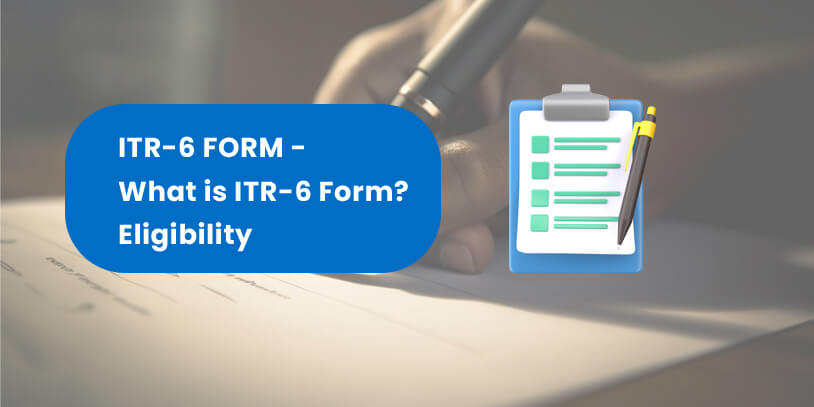
Please Wait transaction is in process, don't refresh page and do not press back button.
File your ITR Now and Claim Early Refund

Income Tax Return (ITR) 6 form is an important document for companies who are not claiming exemption under Section 11 (Income from property held for charitable or religious purposes). It serves as a means for businesses to declare their income and provide required financial statements to the Income Tax Department of India.
What is ITR-6 Form?
ITR 6 form is specially designed for companies which are not claiming exemption under Section 11 of the Income Tax Act, 1961. This also applies to companies other than those claiming exemption under section 11, including companies that are engaged in business activities such as trading. Manufacturing, and providing services.
Eligibility to file ITR-6 Form
Any company which is not claiming exemption under Section 11 (Income from property held for charitable or religious purposes) can use ITR-6 to file its income tax return
Who is not eligible to file ITR 6 Form?
Individuals
Firms
Local authorities
Hindu Undivided Family (HUF)
Bodies of Individuals (BOI)
Associations of Persons (AOP)
Artificial Judicial Persons
E-filing Audit Reports
If the taxpayer is mandated to undergo an audit as per Section 44AB and their financial records have been scrutinized by a qualified chartered accountant, it is imperative to furnish details pertaining to the audit findings, the auditor's particulars, and the date of electronic submission of the audit report to the tax authorities.
How to save Income Tax?
Saving income tax involves employing various tax-saving tools and strategies to reduce your taxable income and overall tax liability. Tax-paying individuals and businesses are constantly looking for ways to reduce tax payments and reduce their overall tax burden. One of the most prevalent approaches is to invest money in tax-saving options such as purchasing health insurance policies, making charitable donations, funding higher education, and investing money in government schemes.
charitable donation:
Contributions made to specific relief funds and charitable organizations are eligible for deduction under section 80G. However, donations made in the form of items like food items and medicines are not eligible for deduction.
Health Insurance Policy:
Taxpayers can claim deduction under Section 80D for the portion of their annual taxable income used for premium payment. The amount deductible from income tax calculations varies depending on the age of the insured person.
Higher Education:
According to Section 80E, interest paid on loans taken for higher education is eligible for deduction from taxable income.
Invest in government schemes:
Many government-regulated schemes offer tax benefits as well as attractive returns on investment. Individuals can avail tax deduction under Section 80C of the Income Tax Act on investments up to Rs 1.5 lakh per year.
Tax advantages can be availed in the following schemes:
Public Provident Fund (PPF): Public Provident Fund is a government-backed savings scheme, has a tenure of 15 years and offers tax-free interest income, making it an attractive option for long-term savings.
National Pension Scheme (NPS): NPS, launched by the Central Government, serves as a means for individuals to secure a stable pension income to meet their retirement needs.
Sukanya Samriddhi Yojana (SSY): SSY, is a government-backed savings scheme aimed at encouraging savings for educational and marital expenses, especially for girls.
Senior Citizen Savings Scheme (SCSS): The Senior Citizens Savings Scheme (SCSS) is a government-backed savings plan specifically tailored for elderly individuals in India. It offers them a secure and dependable investment avenue to safeguard their financial future in retirement.
Latest Post
House Rent Allowance (HRA) Exemption in ITR
11-February-2025
Tractor Insurance: Why It’s Essential for Your Tractor?
17-January-2025
Bike Insurance: How to file two wheeler insurance claim
15-January-2025
Tags